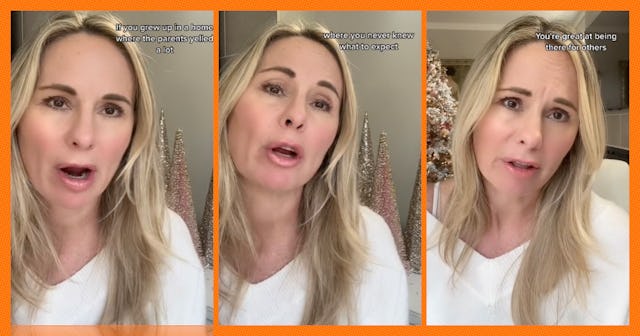“Eggshell Parenting” Is The Newest Parenting Style
You might not even know you are (or had) an eggshell parent.

Kids can be unpredictable, have major mood swings, and speak without thinking. That’s why parents work to be steady, reliable, and nurturing. Kids look to their parents for guidance on how to just be.
It’s no secret that how parents behave and raise their kids can have influence on how a child turns out later in life, so where does the latest TikTok parenting term called “eggshell parenting” fit into this?
What is eggshell parenting?
The phrase eggshell parenting gained popularity when licensed clinical psychologist Dr. Kim Sage went viral on TikTok. She describes the parenting style as making kids feel like they are “walking on eggshells” due to the unpredictability of a parent’s mood and behavior with no warnings or cues.
She describes eggshell parenting as “a way of putting your child in a position where they have to always be hyper vigilant to what may or may not happen next.”
“Even if you’re loving and safe and wonderful, if it follows that you can be unsafe at the core, you are not safe,” she says.
Psychology Today states that children are hyper aware of energy and feelings that work their way through their household. When kids latch onto negative emotions, they often feel insecure and cautious, nervous to make one wrong move. Thus the coined term — “eggshell parenting.”
Examples of eggshell parenting
Examples of eggshell parenting — or what Sage calls “emotionally dangerous behaviors” — build upon each other, making a wary kid who may develop certain behavioral issues of their own later in life.
“Number one: the parent’s mood is like being on a roller coaster. You never know what to expect, but there’s always going to be significant high highs and low lows. Basically, emotionally, you never know what to expect, but you have to prepare for the part where it’s not safe,” Sage explains.
Sage moves onto another more obvious example of eggshell parenting where the parent exhibits verbal abuse.
“In some ways, they verbally make you feel bad about yourself. They might threaten you. They might use punishment to control and intimidate and shame you,” she explains.
“So, when you make a mistake as a child, it’s not about the fact that you’re a developing child. It’s the fact that you must be taught what you did wrong and punished. You must feel bad for it.”
Households run by eggshell parenting typically have a lot of yelling directed at either children or other partners. Sage explains that when environments run on this kind of setting, a person’s nervous system response goes into a “chronic fight or flight” because the screaming is so triggering and dangerous.
Another example of eggshell parenting revolves around guilt-tripping, mocking, dismissing feelings, and gaslighting.
The major outlier of eggshell parenting is that this kind of behavior is not exhibited all the time. At times, kids might feel supported and loved by their parents then the next moment, things can take a turn for the worse.
“And so you must stay on alert for how those are going to feel in your body and in your sort of sense of self ... So, you’re living in a state of walking on eggshells never knowing what defense you have to provide to protect yourself,” Sage continues.
How can eggshell parenting affect my child?
Parents have outbursts, right? It’s totally normal for a parent to reach boiling point from time to time and unleash on their kids, raising their voice and expressing frustration. This is human and normal.
No parent is perfect, but if you’re wondering if you’re exhibiting some eggshell parent behavior, chances are slim that you actually are because you’re self-aware and looking inward, working to fix the behaviors.
How does eggshell parenting affect children?
Sage explains that some children who grow up in homes with eggshell parents may develop different coping mechanisms and adult behaviors later in life that speak to that childhood experience. She explains that the trauma of that experience and childhood lives out through adulthood in what she calls “low-key hypervigilance.”
She explains that children with eggshell parents may develop hypersensitivity to sounds and smells, as well as verbal or non-verbal shifts.
“It’s like you’re always scanning for threat and change, and it can be very triggering in your body and in your emotions for you,” she says.
Adults who experienced eggshell parenting may also hide their own emotions and avoid feelings because, growing up, time was spent scanning a room for danger, monitoring for an outburst.
They may also overanalyze and over-interpret situations, looking for deeper meanings or underlying messaging which is why social situations can be extremely difficult.
“You often want to avoid them. You’ll say ‘Yes!’ to things, but then once it kind of rolls around, you just dread it and try to plan 12 different ways to get out of it, then you might go and be like, ‘OK, that wasn’t so bad,’ but afterwards you feel depleted, fatigued, and exhausted,” Sage notes.
How to break an eggshell parenting cycle
There is a correlation between how a person was raised and how that same person chooses to raise their own children. Typically, unless some active work and change takes places, cycles of abuse tend to continue on.
To reiterate, if you’re concerned you’re an eggshell parent, then you’re halfway there to breaking the cycle.
Next, taking responsibility for your actions, and apologizing to your children after a sudden outburst totally changes the game. Also, taking the time to learn how to self-regulate during those moments when you want to boil over with rage will do wonders for not just your own healing but your child as well.